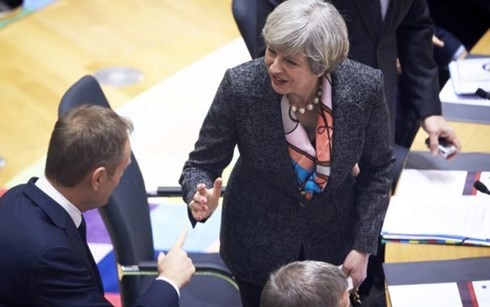(VOVWORLD) -The leaders of the European Union’s 27 member states have formally agreed to move to the next phase of Brexit talks at a summit in Brussels last Friday. The talks will discuss trade relations after Britain leaves the EU.
 ( illustrative photo: euractiv) ( illustrative photo: euractiv)
|
Britain’s vote to leave the EU shocked the world in 2016. Brexit talks, which have cost EU and British leaders a lot of time and effort in 2017, have received enormous media coverage.
Phase 1
Since Brexit talks began on June 19 in Brussels, the EU and Britain have engaged in dialogues on civil rights, Ireland and Northern Ireland, and Britain’s financial responsibility. President of the European Commission Jean-Claude Junker said in October that Brexit talks needed a breakthrough to move to the second phase. EU chief Brexit negotiator Michel Barnier said serious differences hadn’t been resolved, particularly financial issues. The EU Parliament on October 3 adopted a petition which asked EU leaders to suspend the Brexit talks because of insufficient progress.
Secretary of State responsible for Britain’s withdrawal from the European Union, David Davis, said the Brexit talks have been the most complex negotiation ever and any errors in the negotiations could cost taxpayers billions of pounds. He said Britain is ready to declare “no deal” if the EU insists on its unfair demands.
On December 8, the EU and Britain finally drafted a divorce agreement and a week later decided they could move to the next phase of negotiation - trade ties.
Advantages for the EU
During Brexit talks, the EU has taken advantage of the British government’s lack of a clear roadmap or negotiation strategy. Britain entered the negotiations in a great hurry to discuss future trade relations, so it accepted almost all of the EU’s conditions.
The EU has benefited from unity among its 27 members. They are aware that Brexit could spark separatist movements and threaten the EU’s existence. The EU countries are determined to make Britain pay as much as possible for losses caused by its exit. EU negotiators have been encouraged to take a hard line. The Brexit deal reached on December 8 favored the EU. Britain has made certain concessions such as authorizing the European Court of Justice to protect the rights of the 3 million EU citizens living in Britain. Britain has also agreed to pay the EU 45 billion euros and has conceded there will be no hard border with Northern Ireland.
Now the EU and Britain will discuss a bilateral trade agreement. This will be a tougher negotiation than the 1st phase, because the result will profoundly affect national strategic interests.